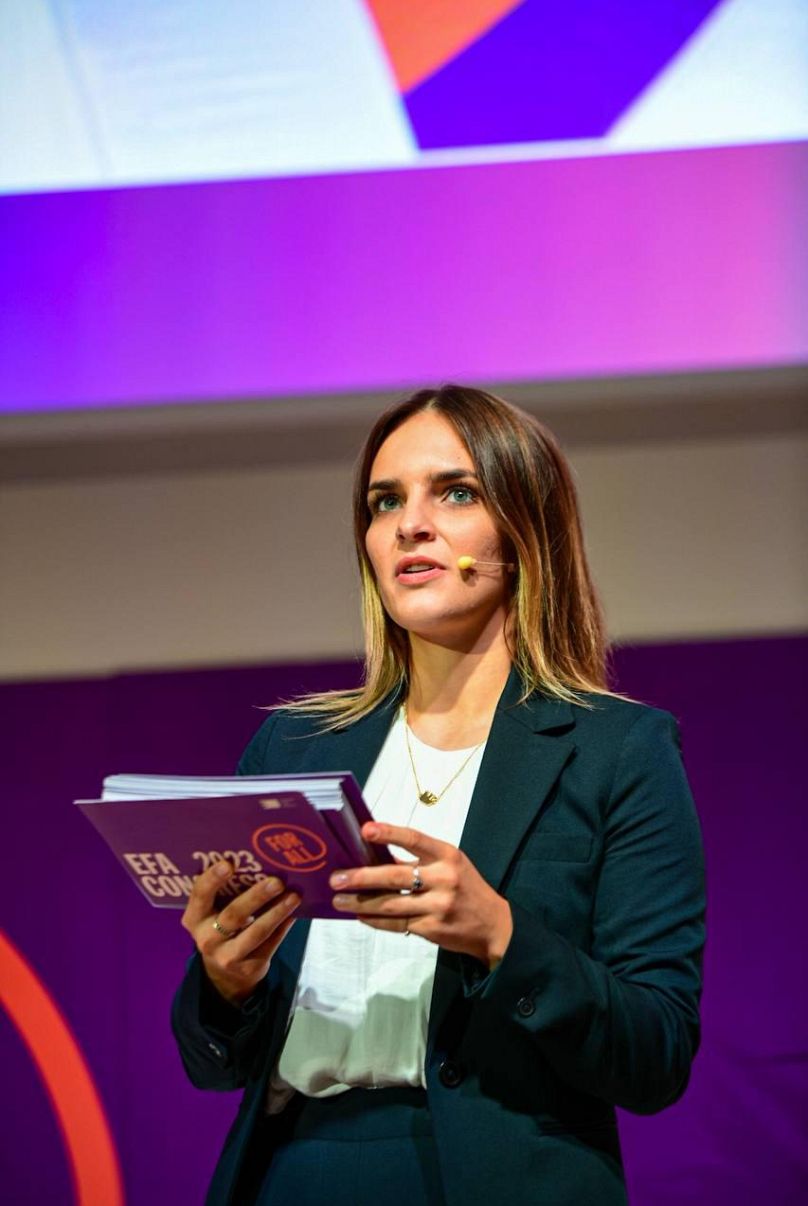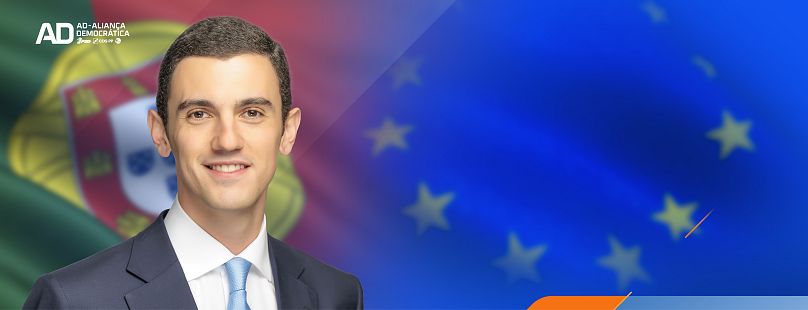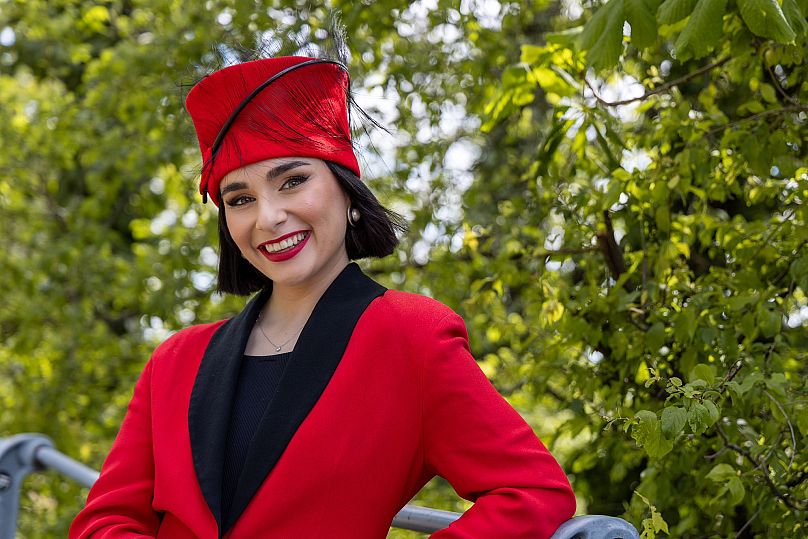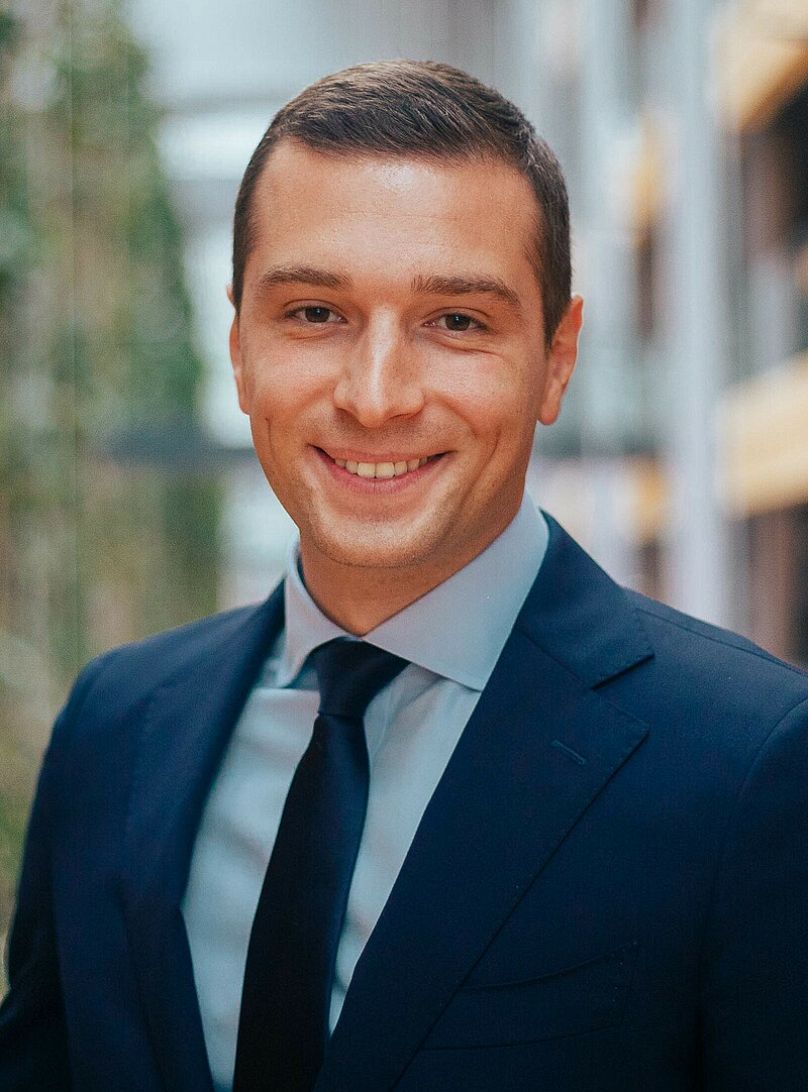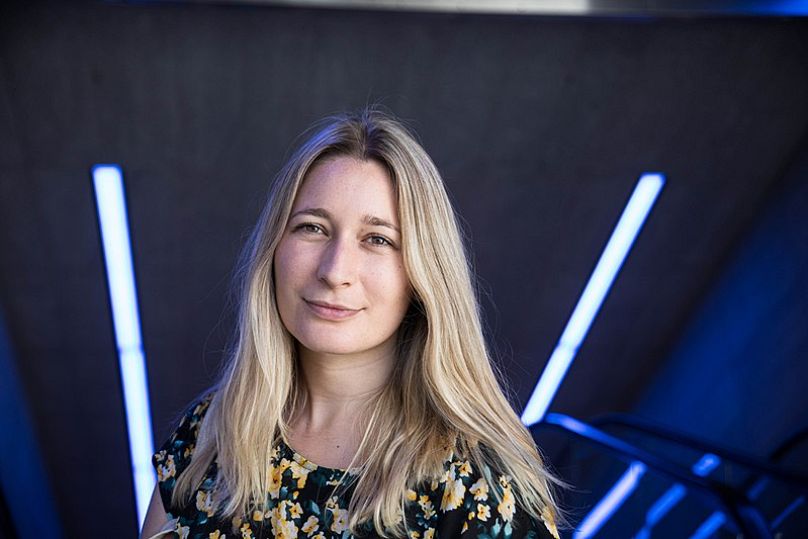Born from the mid-90s to mid-2000s, hailing from both left and right, meet the young candidates reshaping the stage for lawmakers.
Currently, only three members of the European Parliament (MEPs) under 30 years age may reasonably claim to belong to Gen Z. This is likely to change this June with the arrival of a new generation of elected representatives. Euronews selected a handful of candidates to reflect on their precocious political journeys.
 ADVERTISEMENT
ADVERTISEMENT
 ADVERTISEMENT
ADVERTISEMENT
Maylis Roßberg: The Activist
Country: Germany Party: South Schleswig Voters' Association (EFA) Age: 24
Maylis Roßberg is clear, she is an activist, not a politician. She was nevertheless chosen by the European Free Alliance (EFA), which advocates for the right to self-determination of peoples, to represent them as a Spitzenkandidat among the top brass of European politics.
Born in 2000 in Schleswig-Holstein, she comes from a family belonging to the Danish minority of this northern German state. Her political awakening came very young: as a pre-teen, she ventured into political slam poetry, which led to her being noticed by the South Schleswig Voters' Association (SSW), the party representing the state's Danish and Frisian minorities. They invited her to get involved in politics - which she did the day after her fourteenth birthday. She told Euronews that growing up, she did not feel represented in the political landscape as a young woman and a minority, which is why she now wants to inspire others.
She advanced within the party, leading its youth section in 2020, and became involved with its European equivalent, EFA Youth, of which she became president in 2024. When she was offered the role of Spitzenkandidat alongside Catalan Raül Romeva, she hesitated. On the one hand, she felt honoured to be part of a party that trusts its youth; on the other , she feared the social media vitriol often directed at “young women who speak up”. But she took her chance and embarked on her candidacy in October 2023.
Maylis Roßberg gained a burst of notoriety during the Maastricht debate, where she discussed issues affecting youth alongside leading candidates, the EPP's Ursula von der Leyen, Socialist Nicolas Schmit, and Dutch Green MP Bas Eickhout. She told Euronews that she was nervous but thought the best approach was to “be yourself and you won’t regret anything ... as I believed what I had to say was important.”
Outside of her role as Spitzenkandidat, she is a busy young woman juggling her work as a political advisor for the SSW, her studies in socioeconomics at Christian-Albrecht University of Kiel, and her passion for football.
Priorities: Recognition of minorities, Democracy and diversity in political representation.
Where to find her: on Instagram @maylisrossberg
Sebastião Bugalho: The Boomer soul
Country: Portugal Party: Democratic Alliance (EPP) Age: 28
"A talented young man, (...) known throughout the country," although "a bit controversial and disruptive," are the words used by by Luís Montenegro, the Portuguese Prime Minister, to describe the lead candidate of the Democratic Alliance. Bugalho is a familiar face in Portugal since the 28 years old’s TV appearances as political commentator accumulate hundreds of thousands of views on YouTube and he is “controversial” for the conservative, right-wing positions he ardently defends on TV.
In just a few years, he has managed to establish himself in the Portuguese media landscape. Coming from a family of journalists, his mother describes him as being cut from different political cloth from the rest of the family: “My eldest son and I, agree that we disagree on almost everything, he is right-wing, Catholic and conservative." He followed in his parents' footsteps, however, by writing columns as a 20-something political science student. Quickly, he was given a television program in which he made a name for himself by interviewing leading political figures – that is when he acquired the nickname “prodígio” (the prodigy in portuguese). Despite his youth, Sebastião Bugalho likes to describe himself as an old soul. "My best friend says that I came out of my mother's womb reading The Economist – he might be right," he told the Jornal Económico in 2018.
In 2019, at the age of 23, he unsuccessfully ran as a candidate in the legislative elections but two years later when he was offered the place of a resigning deputy to sit for the People's Party, he declined. Instead, he refocused on his area of expertise: political commentary, featuring on major Portuguese media and helping to build CNN Portugal. Alongside former European deputy and current socialist member of the Portuguese parliament, Sérgio Sousa Pinto, he participated in the popular show Contrapoder (Counterpower in English) on the new channel debating hot current topics with a polemic twist.
Before the 2023 legislative elections, he left CNN to join SIC Notícias television and the weekly newspaper Expresso. For these media outlets, he covered campaign news and interviewed various candidates before himself offering his candidacy, accepting an offer from the governing party and launching his own campaign for the European elections.
Since then, he has been mingling with crowds - addressing youth during a visit last week to students in Bragança, promising to "strengthen territorial cohesion, creating jobs and competitiveness in the interior municipalities and districts," but mostly aiming his message at the elderly with his 65+ advantage card project or the fight against desertification. A source close to the candidate told us that he does not want to revolutionize the current system, he wants to appeal to all generations.
Priorities: Pro-European and Atlanticist, housing access and economic growth.
Where to find him: only on X @reis_bugalho
Nina Skočak: The Influencer
Country: Croatia Party: Gen Z list (Independant Party) Age: 26
Nina Skočak is a Croatian influencer, passionate about make-up and vintage clothing. She shares "lifestyle" vlogs with her more than 200,000 followers on TikTok, where they can see her at restaurants, flea markets, decorating her apartment, and giving travel tips. But that's just one aspect of the young woman who is also an expert in European politics and communication.
After completing a master's degree in European politics, she started her career in the EU Bubble in 2022 with a traineeship at the European Parliament, followed by a position at the European Commission Scientific Advice Mechanism. Naturally, she began discussing topics that interested her, giving her social media followers insights on the functioning of European institutions. It gained attraction– her videos have accumulated 12.6 million likes.
In Brussels, she noticed that despite speeches and conferences on youth policy, young people were not adequately represented. "The same goes for national elections; we had three elections this year and saw that the biggest political parties didn't include any young candidates," Skočak told Euronews. "We look at the private sector, there are young CEOs, but in politics, there is huge discrimination towards the youth." So she decided to take matters into her own hands.
She formed an independent list composed of young people passionate about politics, all Gen Z, with an average age of 26 - the youngest candidate being 19. Not being part of any established political party or structure makes it more challenging to reach out to people, yet the young influencer remains optimistic, "when you don't have money, you become creative." So, she ventures off the beaten path and engages with her electorate by organizing pop quizzes, flea markets, or simply communicating in bars frequented by Croatian youth.
Despite holding a master's degree in European politics and having solid professional experience, she is portrayed by Croatian media primarily as an influencer. A situation she describes as "frustrating" for a young woman who wishes to seriously defend her ideas of youth - and gender - inclusion in politics, but also more broadly to improve the living conditions of young people.
Priorities: Youth inclusion in politics, sustainable and green economy and women's rights.
Where to find her: on TikTok @ninaskocak
Jordan Bardella: The Mastermind
Country: France Party: National Rally (ID) Age: 28
Born in 1995 in a Parisian suburb, this son of Italian immigrants has had a meteoric political career. Influenced by the violent riots in the French suburbs in 2005, he entered politics at the age of 17, joining Marine Le Pen's far-right party, the National Rally. Two years later, he dropped out of his Geography studies to devote himself to politics. He served consecutively as a regional councilor, spokesperson, vice-president of the party, before leading the National Rally's list in the 2019 European elections at just 23 years old. In November 2022, he was elected successor of Marine Le Pen as the president of the far-right party. The following year he was appointed, for the second consecutive time, as the National Rally's lead candidate - he is expected to sit for another five years in the hemicycle.
He is not particularly proactive in the European Parliament, since he has not initiated any parliamentary reports and is absent from 75% of the meetings of his parliamentary committee. He shines on TV shows, however, with striking punchlines, and even more so on social media platforms. There he masters the tropes: whether its trending music, funny sound effects, compilations of his best comebacks, casual moments captured on the spot (such as enjoying a sausage roll among factory workers). He boasts 1.2 million followers on TikTok, the social network beloved of 18-25 year olds, a demographic for which the National Rally's list is credited with 32% of voting intentions.
He uses TikTok, he says, as a means "to reach out to young people who are depoliticised and become politicised through social media".
Priorities: security, the primacy of French law, end to illegal immigration.
Where to find him: on TikTok @jordanbardella
Kira Marie Peter-Hansen: The Youngest of the Youngest
Country: Denmark Party: Green Left (Greens/EFA) Age: 26
As a 21 year-old Dane, Peter-Hansen just scraped in as the youngest Member of the European Parliament ever elected in 2019. The Socialist People's Party's second and last place was supposed to go to Karsten Hønge, but he ultimately chose to withdraw to pursue a national mandate. She then agreed to head to Brussels though it meant quitting her economics studies at the University of Copenhagen.
In January, the Dane told Euronews that she faced criticism for her lack of experience at the beginning of her mandate. Yet, she entrenched herself in her favourite topic - economics, becoming vice-chair of the taxation and member of the economic affairs and employment committees. Euronews ranked her fourth in its top MEPs dominating economic and finance policy after the elections. She stood out by working on key anti-money laundering reforms and leading negotiations on the pay transparency directive, legislation that will require EU companies to share information on salaries and take action if their gender pay gap exceeds 5%.
To complete her CV, she became vice-president of the political group Greens/EFA in 2021 and was nominated in 2024 as a “rising star” by EP magazine. Nevertheless, five years in, the criticisms still persist: "I often hear that I don't have enough experience. But I'm 25 now, and you have a number of MEPs who have been here longer than I have been born. I think to me that's totally crazy."
In parallel to her work as an MEP, she is pursuing a part time bachelor's in international relations at the Vrije Universiteit Brussel (VUB). In 2024, she was nominated to lead the Socialist People's Party list for the European elections and has a high chance of being re-elected.
Priorities: Climate, feminism and solidarity.
Where to find her: on Instagram @kiraphansen
Youth representation
In all EU countries, the average age of the lawmakers (blue line) is well above the average age of the population (blue columns). In Lithuania, there is a 20 year gap in the representation: the average age of the population is 45 years old when the average age of the 11 MEPs is 65.
When looking at the younger members of the EP, only three are under 30: Kira Marie Peter-Hansen (26), Jordan Bardella (28) and Martine Kemp (29). Clara Massé, the campaign manager for the French Young Europeans deplored this representation gap: “Young people under 30 are underrepresented, they constitute only 0.43% of the European Parliament.” For the 2024 elections she admits that "efforts are made with quite a few top candidates under 35 years old, but still, there are rarely more than three candidates out of the top 10 on each list who are below this threshold. However, no public policy can be built without the contribution of those who will be affected by it."
An EP Think Tank report claimed that the low turnout of young voters in past European Elections is partly due to that representation gap. To break this barrier, the study recommended lowering the candidacy age to 18 or voting to 16. For now, 16 years olds can only vote in Austria, Germany, Belgium, and Malta and 17 years olds in Greece.
The president of the European Youth Forum, a youth advocacy association, Rareș Voicu, told Euronews that young candidates are essentials to bring fresh ideas: “We need politicians who understand what it means to be young today, to take seriously challenges such as climate change, affordable accommodation and mental health."











